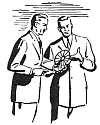 We
gave the sample spring this shot treatment and sent it back to
the makers for a test. To their surprise, instead of breaking when it
was flexed 2,000 times, they found that it would now withstand more
than two million such cycles without breaking - an improvement of
100,000 per cent. Although this high per cent improvement was an
exception, gains of 50, 100 or 500 per cent on various parts are now
quite common. Yet, all we did was to question the theory of the
polished surface, and apply a modern version of a very old art. We
gave the sample spring this shot treatment and sent it back to
the makers for a test. To their surprise, instead of breaking when it
was flexed 2,000 times, they found that it would now withstand more
than two million such cycles without breaking - an improvement of
100,000 per cent. Although this high per cent improvement was an
exception, gains of 50, 100 or 500 per cent on various parts are now
quite common. Yet, all we did was to question the theory of the
polished surface, and apply a modern version of a very old art.This new information turned out to be of great value in the war. We know, for example, that engineers are constantly trying to increase the power of airplane engines without increasing their  weight. This means
that engine parts must be made stronger to carry greater loads. On many
pieces, shot blasting was a simple and quick way. Now some engine parts
that formerly developed a thousand horsepower are carrying a 50 per
cent greater load. No weight has been added. They have simply been
given this new treatment. And, as in the case of the Romans and the
Celts, this improvement in weapons might mean the difference between a
defeat and a victory. weight. This means
that engine parts must be made stronger to carry greater loads. On many
pieces, shot blasting was a simple and quick way. Now some engine parts
that formerly developed a thousand horsepower are carrying a 50 per
cent greater load. No weight has been added. They have simply been
given this new treatment. And, as in the case of the Romans and the
Celts, this improvement in weapons might mean the difference between a
defeat and a victory. |








